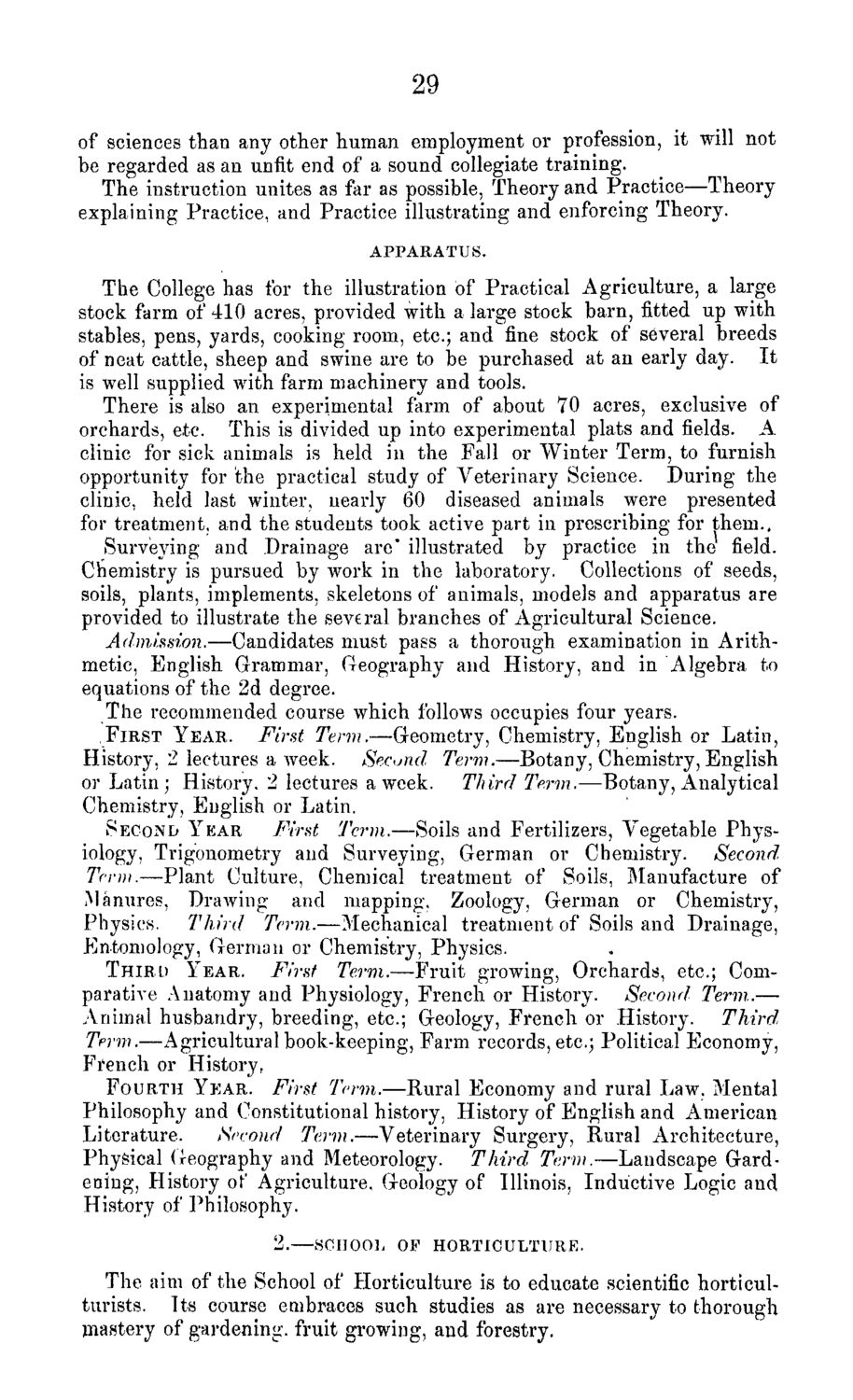| |
| |
Caption: Course Catalog - 1870-1871
This is a reduced-resolution page image for fast online browsing.

EXTRACTED TEXT FROM PAGE:
29 of sciences than any other human employment or profession, it will not be regarded as an unfit end of a sound collegiate training. The instruction unites as far as possible, Theory and Practice—Theory explaining Practice, and Practice illustrating and enforcing Theory. APPARATUS. The College has for the illustration of Practical Agriculture, a large stock farm of 410 acres, provided with a large stock barn, fitted up with stables, pens, yards, cooking room, etc.; and fine stock of several breeds of neat cattle, sheep and swine are to be purchased at an early day. It is well supplied with farm machinery and tools. There is also an experimental farm of about 70 acres, exclusive of orchards, etc. This is divided up into experimental plats and fields. A clinic for sick animals is held in the Fall or Winter Term, to furnish opportunity for the practical study of Veterinary Science. During the clinic, held last winter, nearly 60 diseased animals were presented for treatment, and the students took active part in prescribing for them.. Surveying and Drainage are" illustrated by practice in the field. Chemistry is pursued by work in the laboratory. Collections of seeds, soils, plants, implements, skeletons of animals, models and apparatus are provided to illustrate the several branches of Agricultural Science. Admission.—Candidates must pass a thorough examination in Arithmetic, English Grammar, Geography and History, and in Algebra to equations of the 2d degree. The recommended course which follows occupies four years. FIRST YEAR. First Term.—Geometry, Chemistry, English or Latin, History, 2 lectures a week. Second Term.—Botany, Chemistry, English or Latin; History. 2 lectures a week. Third Term.—Botany, Analytical Chemistry, English or Latin. SECOND YEAR First Term.—Soils and Fertilizers, Vegetable Physiology. Trigonometry and Surveying, German or Chemistry. Second Term.—Plant Culture, Chemical treatment of Soils, Manufacture of Manures, Drawing and mapping. Zoology, German or Chemistry, Physics. Third Term.—Mechanical treatment of Soils and Drainage, Entomology, German or Chemistry, Physics. THIRD YEAR. First Term.—Fruit growing, Orchards, etc.; Comparative Anatomy and Physiology, French or History. Second Term.— Animal husbandry, breeding, etc.; Geology, French or History. Third Term.—Agricultural book-keeping, Farm records, etc.; Political Economy, French or History, FOURTH YEAR. First Term.—Rural Economy and rural Law. Mental Philosophy and Constitutional history, History of English and American Literature. Second Term.—Veterinary Surgery, Rural Architecture, Physical Geography and Meteorology. Third Term.—Landscape Gardening, History of Agriculture, Geology of Illinois, Inductive Logic and History of Philosophy. 2.—SCIIOOli OP HORTICULTURE. The aim of the School of Horticulture is to educate scientific horticulturists. Its course embraces such studies as are necessary to thorough mastery of gardening, fruit growing, and forestry.
| |